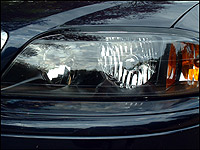Thankfully there is no indecisiveness in terms of handling. The LS feels hard-wired to your senses. Steering inputs are immediately acted upon without objection or unnecessary tire squeal. The LS remains flat when pushed hard in the corners. Over-steer seems non-existent thanks to a rock-solid chassis and an excellent front to rear weight distribution of 53:47 percent.
 |
| The four-wheel independent suspension of the LS is tuned toward performance, so expect to feel the majority of road imperfections. (Photo: Rob Rothwell, Canadian Auto Press) |
Of course, all that handling capability comes with a commensurate sacrifice in ride quality. Its four-wheel independent suspension is tuned toward performance, so expect to feel the majority of road imperfections. Actually, when factoring in that this is not a lowered custom-tuned compact sport model, despite the phat THX audio system, its overly harsh suspension doesn't befit a Lincoln or any luxury sedan for that matter. As a direct comparison to the 540i, that manages comparable performance stats, the LS sport is nowhere near as refined. I believe the engineers at Lincoln need to scratch their heads, sharpen their pencils, and in the end refine the suspension settings in a way that meet the handling expectations without increasing the demand for chiropractic care.
If riding on a cloud is your idea of a Lincoln, the LS V8 with the Sport Package, a $4065 option, is not the car for you. You may be happier in a regular V8 or for that matter a less powerful V6 version of the LS.
Regardless of suspension choice, all LS buyers will expect their Lincolns to stop quickly and precisely, time after time. Again they won't be disappointed. The four-wheel power assisted vented disc brakes on the LS are big and bountiful. At 11.8-inches up front and 11.3-inches at the rear, repeated stops are relatively fade free, even considering its substantial 1,703 kg (3,768 lb) curb weight. The anti-lock technology, standard on the LS, did an excellent job of modulating braking effort in order to prevent lock-up and a possible loss of control.

